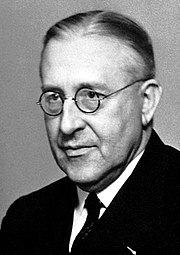 Victor Franz Hess (24 June 1883 – 17 December 1964) was born to a royal forester in Waldstein Castle, Styria (South Austria proper). He attended various local schools and was interested in radiation.
Victor Franz Hess (24 June 1883 – 17 December 1964) was born to a royal forester in Waldstein Castle, Styria (South Austria proper). He attended various local schools and was interested in radiation.His key work was done between 1911-1913. Hess wanted to show that, as expected, the radiation we detect decreases with the altitude – because it originates in the Earth and gets absorbed by the atmosphere. So he took risky balloon trips to 5 kilometers and found out that instead, it was getting stronger. Well, "cosmic rays", as Robert Millikan called them in 1925 when he verified Hess' claims. Their discovery brought Hess the 1936 Nobel prize in physics.
He married a Jewish wife, had to flee the Third Reich because of that, and became a U.S. citizen. After her wife died, he married her last nurse.
 Joseph Henry (December 17, 1797 – May 13, 1878) was born to Scottish immigrants in Albany, New York. His dad died soon, Joseph lived with his grandmom. He became an apprentice watchmaker and silversmith.
Joseph Henry (December 17, 1797 – May 13, 1878) was born to Scottish immigrants in Albany, New York. His dad died soon, Joseph lived with his grandmom. He became an apprentice watchmaker and silversmith.Instead of going to medicine, he decided to build roads. His poverty played various roles in all his academic advances. He was good, however, so they named him a professor of mathematics. He became soon interested in geomagnetism and magnets in general, built the strongest electromagnet. He invented the ideal arrangement of coils that could be used by telegraphs.
Henry studied lots of phenomena in which electricity and magnetism overlapped. For example, he built an early ancestor of the DC motor and discovered self-inductance (voltage in a spiral-shaped wire created by a change of the current going through). Also, he discovered mutual inductance independently of Michael Faraday (Faraday published it first). Add an old doorbell and electric relay.
Many scientists remained unappreciated during their lifetimes. That wasn't Henry's case. He was admired a lot – if not too much – and also became the first secretary of the Smithsonian Institution. His self-control, patience, gentle humor, and background not attracting jealousy helped. The SI unit of inductance is named after him, much like laboratories and a house at Princeton University. He has also made contributions to the determination of the temperatures at various places of the Sun – and to aeronautics.
Henry was an early insider whom Alexander Graham Bell made familiar with the telephone and he also tried to advise Bell – and offered some compliments at official events.
Off-topic: Jo Nova informed me that your humble correspondent was quoted in The Australian (related to the climate politics). See also her article on Lord Monckton.
0 comments:
Post a Comment